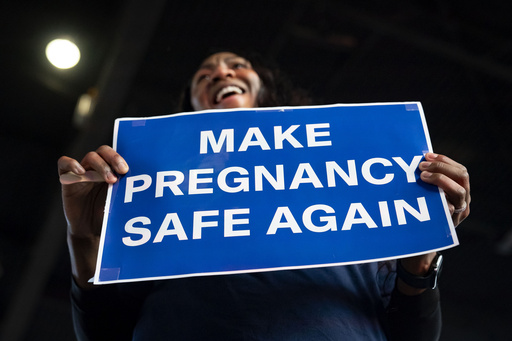
Abortion and reproductive rights have become key issues in the gubernatorial and presidential elections in North Carolina, distinguishing it as a more moderate state on abortion laws compared to other Southern regions.
These topics are particularly prominent in the race for a position on the state Supreme Court, where advocates for abortion rights believe the outcome will significantly impact potential Republican initiatives to increase restrictions. Currently, registered Republicans have a firm hold on five of the seven court seats, and they aim to further solidify their majority in the upcoming election.
Justice Allison Riggs, a Democratic incumbent, is placing a strong emphasis on reproductive rights in her campaign. Her debut television advertisement prominently featured images of Republican gubernatorial candidate Lt. Gov. Mark Robinson, who has voiced a preference for implementing stricter abortion laws that would curtail access earlier than the existing 12-week limit. Riggs expressed concerns that her Republican opponent for the court could potentially be the pivotal vote needed to impose such restrictions.
“This issue is increasingly significant to voters and is landing in front of state Supreme Courts, making it a crucial point in our campaign,” Riggs remarked.
Her opponent, Judge Jefferson Griffin from the Court of Appeals, contended that Riggs is commenting too extensively on a matter that may soon present itself before the court, labeling her approach as a breach of judicial ethics. “Her actions reflect a clear disregard for our judicial standards and codes of conduct,” Griffin said.
The political climate in North Carolina underscores how abortion is driving substantial financial investments in Supreme Court campaigns across various states. Both conservative and liberal organizations have ramped up their funding in efforts to influence judicial decisions that could have lasting implications on abortion rights, voting rights, redistricting, and other critical matters.
Experts believe that these campaigns have been profoundly shaped by the U.S. Supreme Court’s 2022 ruling that dismantled decades of constitutional protections surrounding abortion. Douglas Keith, a senior counsel at the Brennan Center for Justice, noted, “The Dobbs decision has shed light on state courts that previously were overlooked but are now central to resolving major cases that might have traditionally gone to the U.S. Supreme Court.”
This year, elections in thirty-three states could fill 82 Supreme Court seats. The upcoming 2024 election cycle continues a trend of heightened spending seen last year in judicial races in states like Wisconsin and Pennsylvania.
Progressive organizations have notably increased their financial commitments to state court elections this year. The ACLU has allocated $5.4 million towards court races across Montana, Michigan, North Carolina, and Ohio. Additionally, Planned Parenthood, alongside the National Democratic Redistricting Committee, has pledged $5 million to court races in Arizona, Michigan, Montana, North Carolina, Ohio, and Texas, marking a significant escalation in their political investment.
“We are making unprecedented investments in state Supreme Court races, making this a pivotal point for our organization moving forward,” commented Katie Rodihan from Planned Parenthood Votes.
In Ohio, where Republicans currently hold a 4-3 advantage on the court, Democrats are working to protect two seats while contending for a third that is open due to a retirement. The potential shift in control of the court could prove crucial if the state were to appeal a ruling that rejected extensive abortion restrictions, citing the state’s constitutional amendment affirming reproductive rights.
Michigan’s court also features two seats up for election, with the Democratic-backed justices holding a narrow majority. While court races are nonpartisan in nature, candidates are nominated through party conventions. Republicans would need to secure both seats to reverse the current balance in their favor.
Justice Kyra Harris Bolden, who became the first Black woman to serve on Michigan’s Supreme Court when appointed by Democratic Governor Gretchen Whitmer, is contesting against Judge Patrick O’Grady. Furthermore, Republican state Representative Andrew Fink is facing off against Democratic nominee and law professor Kimberly Anne Thomas for another available seat on the court.
Supporters of Bolden and Thomas frame their races as pivotal for abortion rights protections, with advertisements stressing the potential for the Supreme Court to revoke those rights rapidly.
In Montana, intense competition is focusing on two open Supreme Court seats amid Republican criticisms about previous rulings related to abortion access and voting. Former U.S. Magistrate Judge Jerry Lynch is standing against county attorney Cory Swanson for the chief justice position, while state judges Katherine Bidegaray and Dan Wilson vie for a different seat.
Progressive organizations are backing Lynch and Bidegaray, both of whom have publicly aligned with a crucial 1999 state Supreme Court ruling asserting that the constitutional right to privacy encompasses the right to a pre-viability abortion.
Meanwhile, conservative groups are labeling these candidates as excessively liberal, echoing broader Republican messaging, particularly around the issues of transgender participation in sports.
The Republican State Leadership Committee plans to invest significantly in various states, including Arizona, Michigan, Montana, North Carolina, Ohio, and Texas, focusing their campaign efforts on a range of topics beyond abortion.
For instance, one advertisement showcasing three Republican candidates in Ohio references former President Donald Trump alongside issues surrounding immigration.
Additionally, conservative donor Richard Uihlein has provided financial support to groups involved in judicial races in both Montana and Ohio.
Progressive advocates are even eyeing states like Texas, known for solid Republican dominance on the Supreme Court, where efforts are underway to challenge three justices who previously upheld the state’s abortion ban.
In North Carolina, Riggs’ emphasis on abortion rights has led to criticisms from Republican opponents, who argue that her actions breach judicial conduct. However, Riggs stresses that she is simply communicating her values to the electorate without suggesting how she would rule on forthcoming cases.
“It’s essential for me to discuss my principles freely, as informed voting is fundamental for a healthy democracy,” she concluded.

